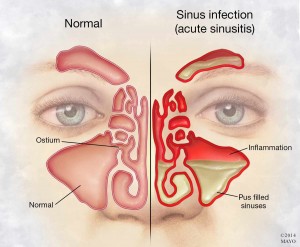-
Mayo Clinic Q & A: Chronic sinusitis symptoms resemble a cold, but last months
DEAR MAYO CLINIC: I’ve had an awful cold for months. My doctor recommends that I be tested for chronic sinusitis. What would that involve? How is chronic sinusitis treated?
ANSWER: Sinusitis is inflammation of the sinuses, which are the air-containing pockets in the skull and facial bones around your nose. Chronic sinusitis develops when inflammation lasts for more than 12 weeks. Testing involves a visit to an ear, nose and throat, or ENT, doctor who will examine your sinuses. Most chronic sinusitis can be managed with medical therapy. However, if your symptoms or the inflammation do not respond to medical therapy, surgery may be necessary. The goal of treatment is to restore sinus health and function.
Symptoms of chronic sinusitis often resemble a cold. A cold is usually caused by a viral infection and is often accompanied by a runny or stuffed-up nose, sneezing, sore throat, watery eyes and a fever. This kind of acute viral sinusitis usually lasts seven to 10 days.
In rare instances, you may get a bacterial infection as a result of a cold, resulting in acute bacterial sinusitis. If that happens, cold symptoms get worse after seven to 10 days. You also may have yellow or green nasal drainage, pain in your face or teeth, and a fever. Acute sinusitis lasts up to four weeks. When symptoms persist for more than 12 weeks, you may have chronic sinusitis. But some cases of chronic sinusitis can develop subtly, without a preceding viral infection.
In chronic sinusitis, the lining of sinus cavities, called mucosa, becomes inflamed and swollen. Chronic sinusitis symptoms usually do not include fever. You may have thick, discolored nasal discharge, often green or yellow, along with nasal congestion. You may feel dull pain or pressure in your cheeks, eyes, forehead or the back of your head. Your sense of smell and taste may be reduced. Sometimes, when the inflammation is very bad, polyps may form in the nose. Polyps occupy the nasal passageways and can cause problems with nasal breathing, drainage and sense of smell.
During an ENT evaluation for chronic sinusitis, your doctor will perform a camera examination called nasal endoscopy. For this exam, a thin tube called an endoscope that has a tiny light and camera at the end is inserted through your nose and into your sinuses. In some cases, a CT scan also may be used to evaluate the sinuses.
If you have chronic sinusitis, medical treatment is usually tried first to reduce the inflammation. Your doctor may recommend medications such as antibiotics, nasal or oral steroids, or a nasal saline rinse.
If medication is not enough to relieve symptoms or control inflammation, you may need sinus surgery. The surgery, known as endoscopic sinus surgery, involves widening the openings of the sinuses to allow for improved drainage and ventilation. It usually is performed entirely through the nose using an endoscope. It should not result in any external bruising or swelling. Typically it is not a very painful procedure, although you may feel tired and congested afterward.
Many surgeons no longer use nasal packing after this surgery, making recovery much more comfortable than it used to be. A procedure called debridement typically is performed a few days after surgery to clean the nasal and sinus passageways. People often notice a large improvement in symptoms after that, and most are able to resume their normal activities at that time.
In most cases, sinus surgery improves symptoms significantly. But even after surgery, many people with chronic sinusitis still require ongoing treatment, such as occasional use of nasal steroids and a nasal rinse to maintain good sinus health.
If you have nasal polyps or if your chronic sinusitis is complicated by other respiratory problems, such as asthma or bronchitis, it is best to have your condition evaluated by a rhinologist — an ENT surgeon that specializes in sinus and nasal disorders. — Devyani Lal, M.D., Otorhinolaryngology, Mayo Clinic, Scottsdale, Ariz.







